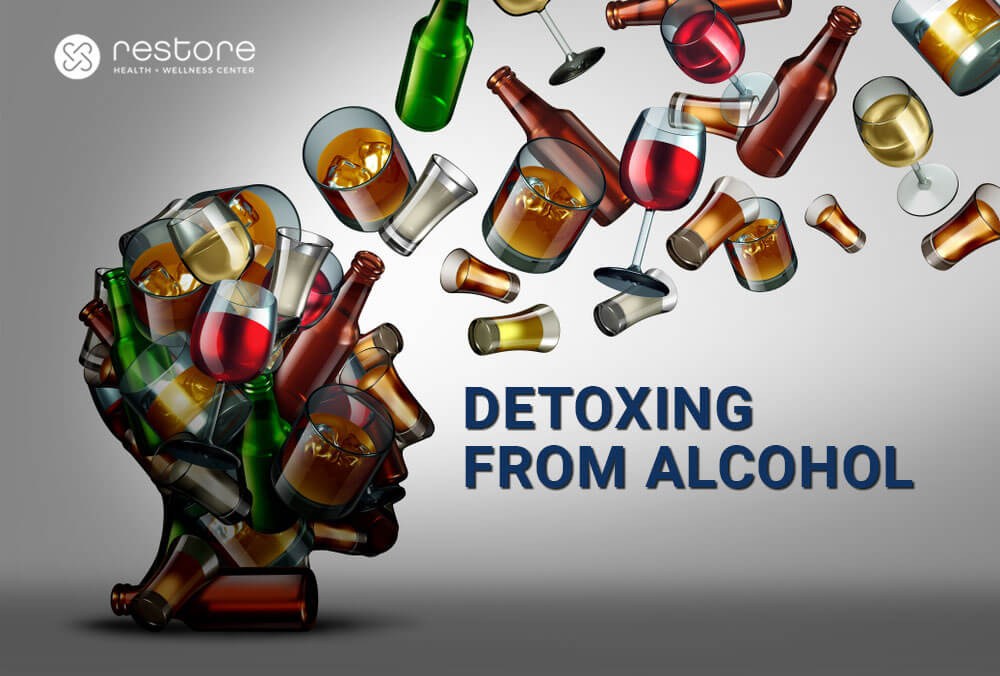
Detox is the first step to treating alcoholism. This is the period when alcohol is completely drained from the body. The patient will likely exhibit alcohol withdrawal symptoms throughout the duration of this process. While most of these symptoms will likely subside after approximately two weeks, there is always a chance that it could take longer. Once detox has been completed, the patient can focus on recovery-oriented activities, therapy, counseling, and participating in various support groups.
The human body naturally develops a dependence on alcohol after years of drinking. Dependence occurs when the brain stops naturally producing the chemicals that it receives from alcohol, which is why it takes the body a specific amount of time to adjust after quitting. This intermittent period is when withdrawal symptoms—including nausea, vomiting, fever, headache, migraine, irregular heartbeat, and even hallucinations—occur most severely.
Withdrawal symptoms are one of the main reasons people are apprehensive to quit drinking. Withdrawal symptoms can vary from individual to individual based on factors like metabolism, rate of consumption, and more. This is why it is important to seek the help of qualified professionals prior to detoxing. Treatment specialists will prescribe medication to help the patient with pain management, allowing them to focus on getting better.
If you or a loved one is addicted and looking into treatment, read on. Here is a brief explanation of what to expect if you are detoxing from alcohol.
Alcohol Detox: Common Symptoms
Alcohol detoxification can involve a wide range of withdrawal symptoms, including both mild and severe. More often than not, the intensity of the withdrawal symptoms is directly correlated with the amount of alcohol intake and overall duration of use. Additionally, individuals who have previously struggled with heavy drinking are far more prone to serious symptoms such as seizures and delirium tremens.
Minor symptoms of alcohol detoxification include nausea, headaches, anxiety, insomnia, and profuse sweating. Conversely, serious symptoms include seizures, tremors, hallucinations, and delirium tremens. This final symptom, delirium tremens, only occurs in rare cases but can be life-threatening.
It is critical to ensure that detoxing patients are monitored by qualified medical professionals. This is doubly true for patients with prior medical conditions, including heart disease, lung disease, and more. In these cases, a treatment specialist will closely monitor blood pressure and heart rate to make sure vitals remain stable. These regular checkups will provide ample time to discuss helpful approaches to specific withdrawal symptoms.
Alcohol Detox: Checkpoints
Withdrawal symptoms can rear their ugly heads in as little as two hours after the patient’s last drink. Typically, the worst symptoms set in first and usually subside after about one week. However, some of the more mild symptoms can last anywhere from several weeks to an entire year. Because of this, there is no way to establish a definitive timeline in regards to the overall length of treatment.
The initial symptoms of withdrawal are usually mild at best, but often grow exponentially worse. Symptoms can include anxiety, mild shaking, nausea, and headaches. By the first day, symptoms can become rather severe. In addition to compounding prior symptoms, patients could experience tremors, seizures, and general disorientation. Day two is relatively similar, although some patients have reported panic attacks and hallucinations. The time between the third and seventh days is often the most crucial, as this is typically when life-threatening symptoms tend to develop.
After the first week, many withdrawal symptoms will have subsided. Remaining symptoms are usually minor and can be treated fairly easily with the right medication. Following the decline of the most serious symptoms, patients will typically experience post-acute withdrawal syndrome (PAWS), which is more prolonged. PAWS symptoms include reduced energy, insomnia, delayed reactions, and general anxiety. These symptoms can last for up to a year.
Detox Medications
If the patient opts to detox at an inpatient rehab facility, doctors will prescribe certain medications to minimize or outright negate certain withdrawal symptoms. These medications are designed to balance critical chemicals in order to prevent unwanted complications. Once prescribed, the patient will be monitored by a professional. If unwanted side effects occur, the professional can recommend different medications or another form of treatment.
Common medications administered during detox treatment include Naltrexone, Disulfiram, Benzodiazepine, and Acamprosate. Naltrexone is widely used to treat opioid addiction, but is also very common in regards to treating alcoholism. It is typically administered within the early stages of detox, and works by blocking the brain receptors that produce a feeling of euphoria when alcohol is introduced.
Disulfiram is different from the other types of medication administered during detox in that it produces adverse reactions whenever alcohol enters the system. For example, someone taking Disulfiram who then imbibes alcohol will experience nausea, general fatigue, headaches, and low blood pressure. While Disulfiram is ideal for deterring drinking, it will not combat cravings.
Benzodiazepines are the most widely known medication administered during detox treatment. They function by calming the central nervous system, which also makes them great for treating anxiety and insomnia. The most common types of Benzodiazepines prescribed in a rehab setting are Valium and Librium.
Acamprosate helps the brain regain normal functionality after the patient is no longer drinking. Additionally, it is also ideal for reducing alcohol cravings. Currently, studies are being conducted to determine whether the medication can be useful in treating PAWS-related symptoms, including anxiety and insomnia.
If you or a loved one are battling alcoholism and are considering entering a treatment program, give Restore Health and Wellness a call today. Their comprehensive treatment programs and impeccable team will give you all the help you need to put you on the road to recovery. We offer alcohol detox in Simi Valley, CA and use proven methods to help you or a loved one break free from addiction. Visit us at 6918 Owensmouth Ave Canoga Park, CA 91303. 24/7 Admissions (818) 722-9019. On-Site Contact (818) 806-3914.




